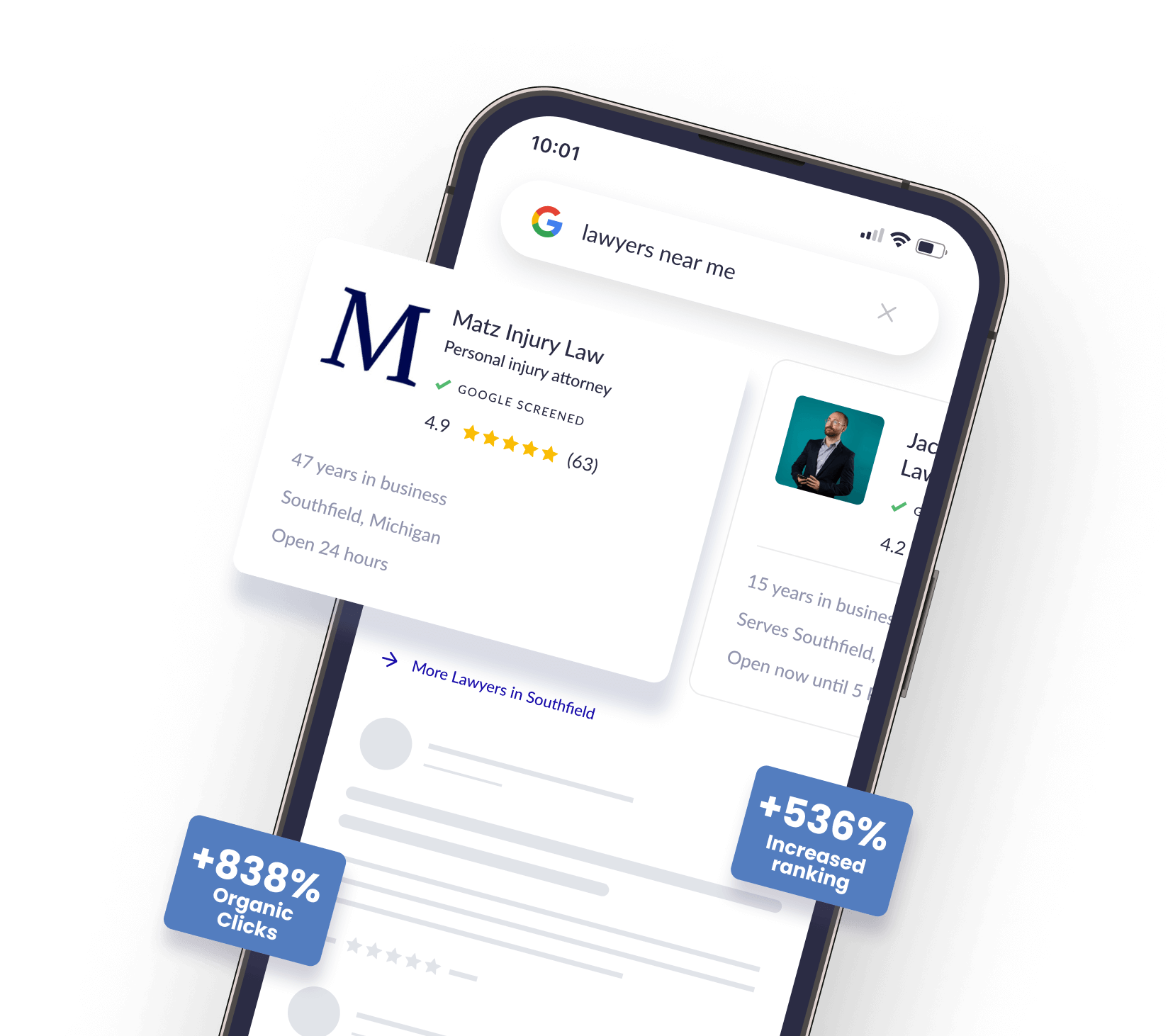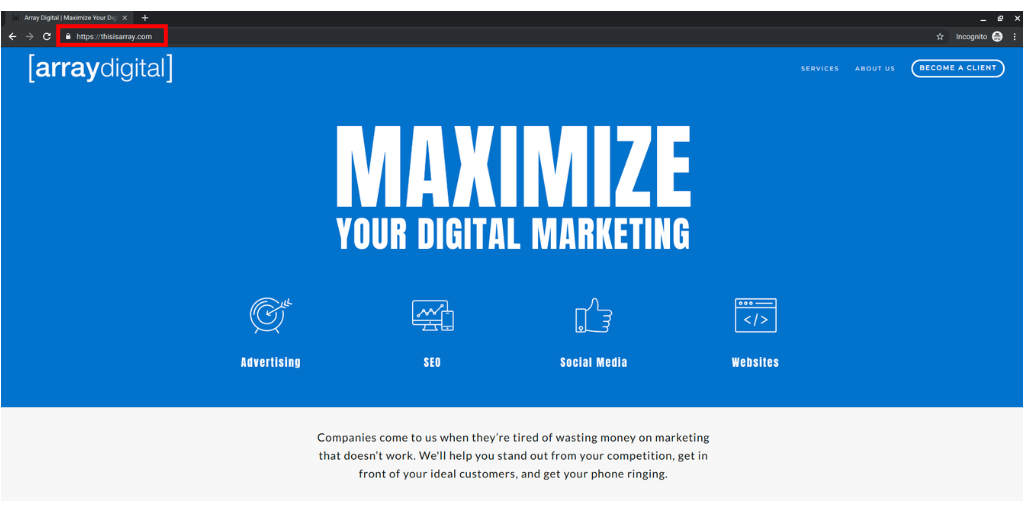
What is a domain name?
You’ve heard the term “domain name” before, but what does that really mean?
The simple answer is that a domain name is what you type into the address bar on an Internet browser to view a specific website. Think of a domain name as your virtual address on the internet – it is how people find your website on the web. There are currently more than 333.8 million domain names registered, a number that increases daily.
As an example, when you type www.thisisarray.com into a web browser “thisisarray.com” is the domain name. The “.com” portion of the domain name is called a Top-Level Domain (TLD). Currently, there are more than 1,000 TLDs that are available on the Internet. Some are completely open to the public, and some are restricted to businesses and organizations that meet certain criteria (e.g. “.edu,” “.gov,” etc.). The most commonly known TLDs are:
- .com – Commercial use
- .net – Originally meant to be used for network sites
- .org – Originally meant to be used by non-profit organizations
- .edu – Colleges, universities, and higher education organizations
- .gov – Government organizations, not available for private use
- .mil – Military use only, not available for private use
What TLD Should I Use?
Despite the number of TLDs to choose from, it is recommended that you use “.com” when possible. Other than the list above, other TLDs haven’t become popular or widely used, so users may not remember that your website is not a “.com” and could give up on trying to find your site. The entire list of TLDs is maintained by the Internet Assigned Number Authority (IANA). To see a complete list of TLDs, click here.
Picking a Domain Name
Once you have decided which TLD to use, it’s time to determine the best domain name for your business. An important first consideration is the length of the domain name. Keep it as short as possible. The shorter the domain name, the easier it will be to remember and type correctly. Shorter domain names are also visually more appealing on marketing materials, both physical and digital. “Thisisarray.com” looks much cleaner than something like ‘Wearethecompanyarraydigital.com’ and is much easier to remember and type. This is an obvious exaggeration but the more concise your web address, the better chance you have of gaining web traffic. Spelling is also important; try not to get too creative with spelling, that’ll just confuse users. Stick with common spellings in your domain name.
Whenever possible, domain names should also represent the brand or image that you or your company are trying to portray. Generally, companies will try to get their actual company name – or at least a part of it – as their domain name because it makes it much easier to remember or find through a search engine. For example, walmart.com, amazon.com, and google.com all use the company name as the domain name. Even if a user can’t remember the specific website domain, they are likely to type in the company name into a search engine and find the site that way.
Picking the optimal domain name may take some time, but it is an important part of branding your company. Your domain is your online identity and allows current and prospective clients to find your business. Just remember to keep it short, meaningful, and easy to remember.
The Costs Associated With A Domain Name
When creating a brand new website, there are several costs associated with the process, from hiring a web development company and purchasing a hosting plan to signing up for a continual support plan and registering a domain name. A good domain name is critical to any new website and will allow users to easily remember and find your website. When people can find your website quickly, it makes it easier for them to make a purchase and for you to increase your sales.
An important question that comes up frequently when a website is being developed is, “How much does it cost to purchase a domain name?” The short answer is anywhere between $10 and $30+ million. Unfortunately, there really isn’t a specific answer, but here is some information that can help you understand the pricing differences you may encounter as you search for that perfect domain name.
Unregistered Domain Names
Domain names that are not registered are the easiest and most cost-effective domain names to purchase. If you are a startup or small business, this type of domain name is the best choice to keep your costs down. The price will typically range between $10 and $20 per year, making the domain name the least expensive piece of your new website.
To get started, find a domain name registration company and search for available domains. Some of the most popular domain name registers include GoDaddy, Register.com, BlueHost, InMotion Hosting, 1and1, and DreamHost. Keep in mind that finding an available domain name that you love might be challenging at first. Make sure that you have some alternates in mind and be flexible. Keep searching to discover suitable domains that are available for purchase. Once you have a list of contenders, narrow that list down until you find an available domain.
If you cannot find an available domain name that you love, then there are other (more expensive) options available.
Aftermarket / Premium Domains
If a domain name is already registered, then you may be able to buy the domain in the domain aftermarket. This type of domain name is often called a premium domain, which is defined by Wikipedia as “the secondary market for Internet domain names in which a party interested in acquiring a domain that is already registered bids or negotiates a price to affect the transfer of registration from the registered holder of that domain name.”
Aftermarket domains range drastically in price. If you are looking to purchase an aftermarket domain, be prepared to spend $3,000 – $30,000 on average. There is no limit to the price tag of a premium domain. The shorter and easier the domain name is to remember, the more valuable the domain will be. Available premium domains will either have a set “buy now” price or you will have to bid on them in an auction.
Here are the top 5 most expensive aftermarket domain names ever sold:
- Insurance.com – $35.6 million (2010)
- Vacationrentals.com – $35 million (2007)
- Privatejet.com – $30.1 million (2012)
- Internet.com – $18 million (2009)
- 360.com – $17 million (2009)
**Data courtesy of Wikipedia.
Here are 4 websites you can search to purchase premium domain names that are already registered:
Domain Backorders
If you have nothing but time on your side, a domain backorder is your ticket to the domain of your choice.
GoDaddy offers a domain backorder service where you can pay $24.98 to get in line to purchase a domain when it expires. GoDaddy describes their process much like getting a numbered ticket at a delicatessen. When a previously owned domain becomes available, the next number in line is called. Getting your domain name through the domain backorders method can be an extremely long process that may never come to fruition. But if you have the time and patience, it does give people an opportunity to own their dream domain name with little upfront cost.
$10 or $10 million, the choice is yours.
At the end of the day, your new website will need a domain. There are different types of domains and price points associated with each. As a business owner, you will have to weigh your options and purchase a domain that both fits within your budget and is easy for your customers to remember. When in doubt, start with an unregistered domain name to keep your cost low. You can always upgrade to a premium domain name in a few years when your business is more established and can responsibly afford the cost.
How to Buy a Domain Name
You will want to buy your domain from a domain registration online. A quick search of registers will yield several results, but below are some of the most popular and highly-rated:
There are several factors to keep in mind when choosing a registrar, and it is worthwhile to do a little research before deciding on one.
Hosting
One of the first things to consider before deciding on a registrar is if you also need hosting for your new domain. Buying a domain allows you rights to that website address, but in order for the website to be publicly viewable, it has to have basic content and be hosted. If you do need hosting, it may be convenient and cost-effective to select a registrar that sells domains and also offers hosting. However, if you have already purchased your domain from a registrar, you are free to set up your hosting with another hosting company. Conversely, if you have a preferred hosting company but you want to buy your domain from another registrar, you can certainly do that.
Cost
Cost is probably the factor that is at the forefront of your mind, and rightfully so. The cost of setting up a new website can quickly add up. The good news is that buying a domain will probably be the least expensive part of your investment in your new website. As long as you are open to a few different domain name options in case your preferred name is already taken, buying the domain can be pretty economical. Still, it is a good idea to shop around and look at different registrars. Be sure to check domain name renewal rates, and if possible, set up auto renewals through the registrar to ensure your domain (and subsequently, your website) never expires.
Domain Transfers
Another thing to consider is the ability to transfer your domain. This might never be an issue, especially if you are happy with your registrar, but if there ever comes a time in which you would like to transfer your domain to a new registrar, it would be helpful to know their transfer policy. Some registrars do not allow domain transfers or will charge a fee. Others make it really easy and will allow you to do so free of charge. If you are thinking about getting a new domain name, make sure you start off on the right foot! Picking the right domain name is important to building brand recognition and trust.
Customer Service
Last, but certainly not least, it is important to find a registrar that is user-friendly and has great customer service. Ideally, you want to find a registrar whose website is easy to use, especially when it comes time to set everything up. And if you run into a problem or need help along the way, it pays to have a registrar with great customer support. Be sure to check out company reviews to find out who offers the best service to their customers, and look around the different registrars’ websites to get a feel for which ones provide a better overall user experience.
While creating a website can seem overwhelming, breaking it up into smaller tasks can help. Remember, buying the domain name from a domain registrar is one of the first steps you should take, along with finding a hosting company. From there, creating content for your website and building it should come next. Following these steps can make the process manageable and easier to determine if you might need help along the way.

Everything you need to know about hiring a digital marketing agency:
- The four pillars of digital marketing
- Digital marketing options and costs
- The pitfalls to avoid
- What to expect when working with an agency
- The qualities to look for in a digital marketing agency

Related Website Design Articles
Extraordinary Results
-
“Erik and the Array Digital team are top notch in the digital marketing spaces, particularly for SEO. Their understanding of Google, the algorithms, and the work involved to get websites ranking on the first page is unparalleled. Thank you Erik!!”
Andrew ZihmerZihmer Law Firm -
“I had a chance to consult with Kevin Daisey for my law firm’s marketing needs. He is knowledgeable, kind, and helpful. He provided me with a great marketing analysis. He also invited me to their podcast as a guest speaker. Thank you Array Digital!”
Merve KatiZMK Law -
“The legal profession needs more architects and designers…folks who are thinking about the future of the profession and who are assembling a tribe of like minded lawyer leaders. Erik and his team are certainly ‘that’.”
Ben GlassBen Glass Law & Great Legal Marketing








